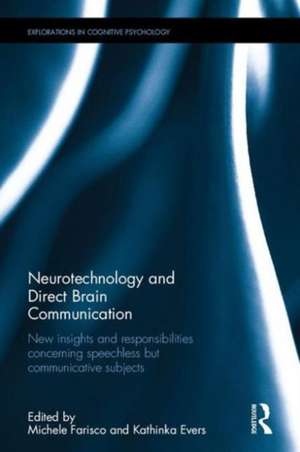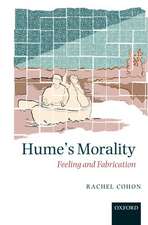Neurotechnology and Direct Brain Communication: New insights and responsibilities concerning speechless but communicative subjects: Explorations in Cognitive Psychology
Editat de Michele Farisco, Kathinka Eversen Limba Engleză Hardback – 10 mai 2016
The book is divided into three parts: the first and second focus on the scientific and clinical implications of neurological tools for DOC patient and infant care. With reference to these developments, the third and final part presents the case for re-evaluating classical ethical and legal concepts, such as authority, informed consent, and privacy.
Neurotechnology and Direct Brain Communication will appeal to researchers and postgraduate students in the fields of cognitive science, medical ethics, medical technology, and the philosophy of the mind. With implications for patient care, it will also be a useful resource for clinicians, medical centres, and health practitioners.
Preț: 846.50 lei
Preț vechi: 1139.75 lei
-26% Nou
Puncte Express: 1270
Preț estimativ în valută:
162.03€ • 176.06$ • 136.19£
162.03€ • 176.06$ • 136.19£
Carte tipărită la comandă
Livrare economică 21 aprilie-05 mai
Preluare comenzi: 021 569.72.76
Specificații
ISBN-13: 9781138851672
ISBN-10: 1138851671
Pagini: 176
Ilustrații: 5
Dimensiuni: 156 x 234 x 15 mm
Greutate: 0.39 kg
Ediția:1
Editura: Taylor & Francis
Colecția Routledge
Seria Explorations in Cognitive Psychology
Locul publicării:Oxford, United Kingdom
ISBN-10: 1138851671
Pagini: 176
Ilustrații: 5
Dimensiuni: 156 x 234 x 15 mm
Greutate: 0.39 kg
Ediția:1
Editura: Taylor & Francis
Colecția Routledge
Seria Explorations in Cognitive Psychology
Locul publicării:Oxford, United Kingdom
Public țintă
Postgraduate and ProfessionalCuprins
Introduction PART I 1. The Emergence of Consciousness: From foetal to newborn life 2. Mapping Mind-Brain Development 3. Cognitive capacities of the infant mind — a neuroimaging perspective 4. Neural Infantese. Detecting pain and suffering in preverbal infants by means of neuro-technological communication PART II 5. Does task-evoked activity entail consciousness in vegetative state? “Neuronal-phenomenal inference” versus “neuronal-phenomenal dissociation” 6. Neurotechnological communication with patients with disorders of consciousness 7. Instrumental assessment of residual consciousness in DOCs PART III 8. Ethical and deontological issues in paediatric clinical studies: an analysis of documents from national and international institutions 9. Disorders of consciousness and informed consent 10. Brain-Imaging and Privacy Concerns Conclusion
Descriere
This book focuses on recent neuroscientific investigations of infant brains and of brains with disorders of consciousness, both of which are at the forefront of contemporary neuroscience.
























